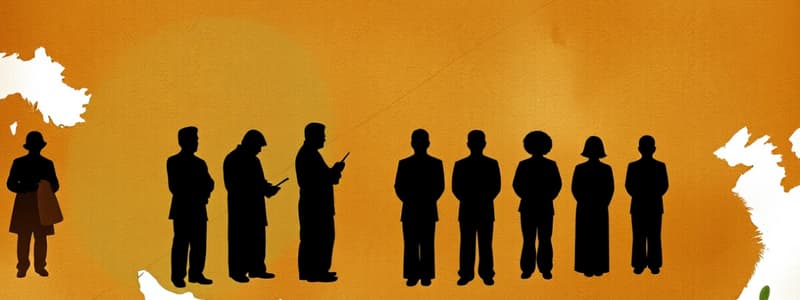Podcast
Questions and Answers
What is the Treaty of Westphalia known for?
What is the Treaty of Westphalia known for?
- Ending the 30- and 80-years wars in Europe (correct)
- Creating the United Nations
- Recognizing the sovereignty of states (correct)
- Establishing the League of Nations
What is defined as a social group linked through common descent, culture, language, and territorial contiguity?
What is defined as a social group linked through common descent, culture, language, and territorial contiguity?
Nation
What is the term for the institutional form that arises after the decline of the feudal system?
What is the term for the institutional form that arises after the decline of the feudal system?
State
A nation-state integrates sub-groups that define themselves as a nation with the organizational structure of the state.
A nation-state integrates sub-groups that define themselves as a nation with the organizational structure of the state.
What does the term 'national identity' refer to?
What does the term 'national identity' refer to?
Benedict Anderson described the nation as an 'imagined ______ community'.
Benedict Anderson described the nation as an 'imagined ______ community'.
What principle did the Treaty of Westphalia establish regarding state authority?
What principle did the Treaty of Westphalia establish regarding state authority?
Who was the primary figure challenging the stability of the Westphalian system?
Who was the primary figure challenging the stability of the Westphalian system?
Flashcards are hidden until you start studying
Study Notes
Community
- A community consists of individuals sharing a common identity and belonging.
- Forms the foundation of a nation, fostering a sense of unity.
Context
- The Treaty of Westphalia (1648) ended the Thirty Years' and Eighty Years' Wars in Europe.
- Established a system recognizing sovereign states at its core.
Components of Nation-States
- Nation (Cerney 2007): Social groups linked by common descent, culture, language, and territory.
- State (Cerney 2007): Emerged after the feudal system, characterized by:
- Centralized authority beyond city-states.
- Institutionalized office holders who are not beholden to socio-economic hierarchies.
- Resource allocation through taxation rather than feudal or religious obligations.
- A state has the capacity for internal and external collective actions, such as taxation and warfare.
Nation-State
- A nation-state integrates national sub-groups within a state's organizational structure.
National Identity
- Described as a dynamic collective identity based on the belief in shared characteristics differentiating a community from others.
- Influenced by factors such as monarchy, sports, and religion.
Nationalism
- A movement advocating for the nation as the foundation of political structures, particularly states.
Imagined Community
- Coined by Benedict Anderson (2006) as an "imagined political community" existing in people’s minds.
- National experiences are characterized by several aspects:
- Personal contact is impossible; individuals must envision their shared identity.
- Nations do not consider themselves universally inclusive.
- Sovereignty implies independence and freedom.
- There exists a sense of deep camaraderie, despite inequalities within nations.
Indicators of Imagined Community
- Print media (e.g., newspapers, novels) and digital media (e.g., internet, social media) facilitate the maintenance and dissemination of communal identity among dispersed populations.
Principles of the Treaty of Westphalia
- Established that all states are free and equal, with no higher temporal authority.
- States possess ultimate authority over both internal and external matters.
- Power acquisition legitimizes rule, with might dictating right.
- States can engage in agreements on behalf of people irrespective of their constitutional status.
- State actions towards non-citizens are not bound by the same standards as those for citizens.
- Non-state actors cannot contest territorial borders.
The Interstate System
- The Westphalian system initially provided stability to European nations until challenged by Napoleon Bonaparte’s ambitions.
- Napoleonic Wars (1803-1815) aimed to spread the principles of the French Revolution: liberty, equality, fraternity.
Studying That Suits You
Use AI to generate personalized quizzes and flashcards to suit your learning preferences.




